
Limping parliament and unmet expectations
Shakhawat Liton
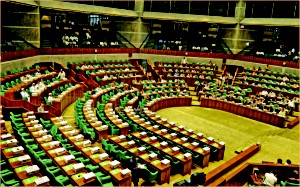 |
Photo: Star |
IN a modern democracy the primary function of the parliament is to embody the will of the people. It is the supreme political institution through which people seek to realise their aspirations, urges and expectations.
Parliament also acts as a forum for ventilation of the grievances of the people, their difficulties and their passions, anxieties and frustrations. Various grievances, aspirations and needs of the people are discussed in the parliament and necessary legislation is enacted in this regard.
And in an ideal parliamentary democratic polity, the other cardinal roles and functions of the parliament are to form or end a government, legislate, hold the government accountable for its actions, monitor the expenditure of public funds, be a forum for debate and to call for information.
Unfortunately, Bangladesh's Parliament, which is also constitutionally known as the House of the Nation, has badly been failed to embody the will of the people and to perform efficiently of its cardinal functions.
Since country's independence in 1971, people were allowed to elect their representatives by exercising their franchise for nine times to constitute the parliaments with the hope that their representatives would work for their welfare.
But their expectations remain unfulfilled due to mainly lack of political will of the successive governments, growing confrontational political culture and military intervention in politics as well as. Over the years, quality of parliament has been decreased due to an alarming increase of money and muscle power in politics.
Instead of strengthening the parliament, every successive executive branches left no stone unturned to consolidate its position either by making the parliament dysfunctional or making it rubber stamp. The executive branch still controls the parliament's legislative powers.
Since restoration of parliamentary democracy in 1991, the ruling parties' 'winner takes all attitude' and the opposition parties mindless boycotting of parliaments worsening the situation. MPs now seem to feel comfort in spending hour after hours in parliament to praise their parties' 'supreme leaders' and blasting their political rivals, instead of discussing public important issues and government policies.
Moreover, the parliament has largely lost its power and pre-eminence due to some changes brought to the constitution by the 4th, 5th, 12th and 13th amendments. The original constitution of 1972 ensured by and large the parliament's supremacy over the executive and judicial branches of the state. But the amendments brought by both military rulers and elected governments, not only eroded parliament's power, it made the House subservient to the chief executive in some cases.
For example, the legislature was empowered to remove constitutional officers such as the judges of Supreme Court, the chief election commissioner, election commissioners, the chairman and members of the Public Service Commission, and the comptroller and auditor general -- on grounds of misconduct and incapacity. But the amendments to the constitution took away the parliament's power in this regard.
Not only that the country was run without existence of parliament as many as 11 years since beginning of the journey of first parliament in 1973 due to imposition of martial law twice and political turmoil in various occasions.
In fact, the existing scenery has proved that Bangladesh's parliament still bears the legacy of the British and Pakistan periods when the practice of representative form of government has had to face a number of obstacles.
Expected change did not take place contributing to evolving of parliamentarism in the independent Bangladesh although the country's experience and experiment with the institution of parliament dates back to the 19th century when the Legislative Council of Bengal was established in 1861.
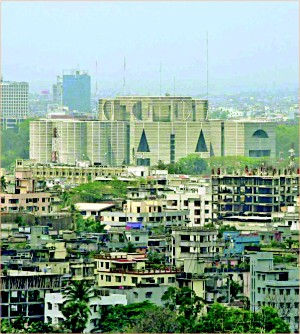 |
PHOTO: Sk Enamul Haq |
Setback at the beginning of journey
It is unfortunate that the Constituent Assembly faced a setback at the beginning of its journey in the independent Bangladesh. Even under the newly introduced parliamentary system of government, the assembly was not given the power to make laws for the country and to control the cabinet or to control the public expenditure.
Comprised of representatives elected to the national and provincial assembly's elections held in between December 7 of 1970 and March1 of 1971, the assembly was given the only power to frame country's constitution. The law-making power was vested with the president who was to do everything on the advice of the premier. The cabinet was neither collectively responsible to the assembly nor answerable to people representatives.
The beginning of the constituent assemblies in India and Pakistan was contrast with that of Bangladesh. The Indian dependence Act had provisions for the creation of two Constituent Assemblies--one for India and one for Pakistan. The act also provided that until new constitutions were framed, the Constituent Assemblies of both the countries would act as central legislatures for the countries.
But the Constituent Assembly of Bangladesh Order issued by the president on March 22 of 1972 on advice of Prime Minister Sheikh Mujibur Rahman limited the assembly's function only to frame the constitution. Therefore, there was a parliamentary form of government, but the assembly had no function to work as a parliament.
Thus, the Constituent Assembly began journey on April 10, 1972. On the second day of the assembly meeting, a member of the assembly KM Obaidur Rahman, who belonged to the ruling Awami League (AL), raised a vital question- why was not the Constituent Assembly given law making power? He proposed that the assembly be simultaneously allowed to function as a parliament.
Prime Minister Sheikh Mujibur Rahman, who was also the leader of the AL parliamentary party, reacted sharply at this proposal. He censured Obaidur and expressed his deep annoyance by warning that no member of assembly belonging to the AL would be allowed to move any resolution without the prior acknowledgement and approval of the party in the assembly. Any breach of such discipline would end in the expulsion of the member concerned, Bangabandhu warned.
At that time, expulsion from the party meant losing membership in the assembly according to the Constituent Assembly of Bangladesh Order issued by the president on March 22, 1972 on advice of the prime minister.
Before Obaidur, barrister Amir-ul Islam, who was a member of the constitution drafting committee, on January 10 at a meeting of ruling AL, opined that it would be undemocratic if the Constituent Assembly was not given the power of legislation. A book styled 'Making the Constitution of Bangladesh' written by barrister Abdul Halim revealed it quoting barrister Amir.
The book said at this suggestion Sheikh Mujib stopped him [Amir-ul] by saying-“You are inexperienced young man. What knowledge do you keep about state administration?”
Finally, the Constituent Assembly passed the constitution bill on November 4, 1972. The new constitution was given effective on December 16, 1972 and the constituent assembly was dissolved on that day. The constitution vested the Republic's legislative powers in the parliament. Under the new constitution, the first parliamentary election was held on March 7, 1973 and the first parliament began journey April 7 of the same year.
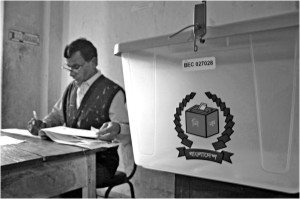 |
Photo: Amdadul Huq/Drik News |
The first cruel attack!
It is ironic that the AL, which attempted to establish the parliament as the supreme law making body in the aftermath of the war of independence, later took steps to make it subservient to the executive branch. The regime made the first parliament to pass the constitution's fourth amendment act on January 25, 1975, switching over to the presidential form of the government from the parliamentary system. Sheikh Mujibur Rahman became the president again.
Only around two years after the first parliament began journey under the parliamentary democracy, the parliament became quite ineffective and turned into an acquiescent totally in the hand of all-powerful president. Through the constitutional amendment one party system was introduced dissolving all other political parties. Restrictions on MPs elected in the first parliamentary polls were more stringent by bringing amendment to the article 70 and they were forced to join the national political party to save their membership in parliament. The number of parliamentary session in a year was decreased.
Many political scientists observed the first political order of Bangladesh during Mujib era was more in the nature of a prime minister dictatorship than a genuine parliamentary one. His dominating personality prevented smooth development of others organs of democracy like, president, parliament, political parties, opposition in parliament, cabinet, parliamentary party etc. However, while poised on the brink of this 'new beginning', Bangabandhu was brutally assassinated and his government was overthrown by a military coup on August 15 of 1975, beginning the first martial law regime in the country. The country's first parliament was dissolved with effect from November 6, 1975 by the extra-constitutional usurpers of state power.
Under cover of darkness
Since the August 15 bloody changeover till December 1990, the country was governed by the military rulers either directly or indirectly under cover of civilian rules. The military rulers opted for the presidential form of government introduced by the constitution fourth amendment act.
The first martial law regime began after the brutal assassination of Bangabandhu made the constitution subservient to the martial law proclamations, orders and regulations. Even the extra-constitutional usurpers---Justice Sayem and General Ziaur Rahman respectively started brining changes to the constitution right away through martial law proclamations although only the parliament is empowered to amend the constitution following proper procedure.
But in absence of the parliament, they did it through martial law proclamations and destroyed some of the basic structures of the country's supreme law.
General Ziaur Rahman, who led the first martial law regime for most of the time, moved to legitimize his rule. In doing so, he needed a parliament to lawfully amend the constitution to ratify and validate all of his and his predecessors' illegal acts. He founded a political party, BNP and organised the second parliamentary election in February 1979. Under patronisation of military regime, the BNP got over a two-third majority in the farcical elections and came to power.
Thus, the second parliament was constituted and country got a parliament after over three years into dissolving the first parliament.
Under the martial law regime, the parliament began journey on April 2, 1979 with the only major task to provide blanket indemnity to all illegal activities including destruction some basic structures of the constitution. The parliament was made to pass the constitution fifth amendment bill, ratifying all orders and actions made or taken under martial law proclamations, regulations, orders, etc during the first martial law regime between August 15, 1975 and April 9, 1979. Cancellation of the fifth amendment act by the country's apex court proved that the military regime abused the parliament to pass the bill.
After being indemnified, military ruler Ziaur Rahman withdrew the martial law giving the constitution full effect.
The second parliament however embraced the same fate like the first parliament. The then army chief General HM Ershad grabbed the state power on March 24, 1982, by overthrowing elected president Justice Abdus Sattar in a coup. He suspended the constitution and dissolved the second parliament and started governing the country by issuing martial law proclamations, orders and regulations.
General Ershad also followed the path of his predecessor Zia. He formed a political party, Jatiya Party and organised the third parliamentary election on May 7 of 1986. And the country got a parliament after a break of over four years. But the parliament's fate was the same as its major task was to indemnify the military ruler and his unlawful activities. Jatiya Party came to power through the third parliamentary elections. It made the parliament to pass the seventh amendment on November 10, 1986, giving a blanket coverage to Ershad's deeds. Nullification of the seventh amendment by the Supreme Court also proved that the parliament did not have authority to pass such amendment bill.
The third parliament was dissolved on December 6, 1987 only after 17 months since its journey. After around three months, the fourth parliament was constituted through a farcical election held on March 3, 1988 amid the boycott by all major opposition political parties. The one-party parliament was unable to continue its functions. In face of growing political agitation, Ershad resigned as president and dissolved the parliament on December 6, 1990, paving the way for restoration of democracy in the country.
It will not be exaggeration to say that the major functions of the parliaments during the military regimes were to serve the interests of the military rulers, not to serve interests of the people.
Boycott culture cripples JS
Since the restoration of the parliamentary system of governance in 1991, four parliaments were formed through elections which were by and large free and fair. [The sixth parliament which was constituted following the farcical election in February 1996 was not included in this discussion. This parliament had a life of only 11 days].
But the alarming rise of House boycott culture crippled the parliaments. In their bid to counter the ruling party's 'winner takes all' attitude, the opposition lawmakers have been holding parliament 'hostage' to realise their demands, most of which are related to their personal and partisan interests.
Sticking to their guns, the opposition lawmakers boycotted over half the total sittings of parliament in the last 20 years. Since 1991 to 2010, the parliaments including the current one had so far 1329 sittings while the opposition lawmakers boycotted as many as 651 sittings. Over half the business of parliaments was transacted without participation of opposition lawmakers, who dodged their duties and betrayed the people's expectations.
The culture was born in the fifth parliament when the then AL-led opposition started boycotting parliament to realise their demands. The then AL lawmakers boycotted 135 out of 400 sittings of the fifth parliament. Interestingly, the boycott resulted in introduction of an undemocratic government -- caretaker government system -- for around three months to hold the parliamentary elections.
The then ruling BNP's mentality to abuse state power to ensure victory in the election contributed to drumming up people's support for the demand to constitute the caretaker government system.
The seventh parliamentary election was held on June 12, 1996 under the caretaker government and a new parliament was constituted. The parliament boycott culture, which was born in the fifth parliament, got a fresh impetus in the seventh parliament when the then main opposition BNP started boycotting parliament. They boycotted 163 out of total 382 sittings of the seventh parliament, between 1996-2001.
In the seventh parliament, the then ruling AL, which had given birth to the culture in the fifth parliament, had a strong voice against parliament boycott. But when the AL again found itself in the opposition bench in the eighth parliament, it set another example of boycotting parliament from the beginning of the new House.
It did not join the inaugural session, making the eighth parliament unlucky compared to the fifth and seventh parliament that began journey with the presence of the then main opposition lawmakers.
The AL lawmakers remained absent from 70 consecutive sittings since the beginning of the new parliament. They joined the parliamentary committees after around three years. Raising different issues, and in protest of the then ruling BNP's refusal to allow discussions on important national issues, the AL started boycotting the parliament. They boycotted 223 out of 373 sittings of the eighth parliament, between 2001-2006.
The ninth parliament began its journey on January 25 with the presence of main opposition BNP lawmakers. Their presence on the inaugural day of the new parliament raised the hope for changes in the political culture, particularly parliament boycott. But the culture did not disappear from the political landscape. 'No compromise' attitude of the ruling and main opposition party brought back the negative culture within a few days after the new parliament's journey. BNP lawmakers have already boycotted 131 out of 174 sittings of the ninth parliament.
Deterioration into quality
The parliament is consisted of three hundred members who are elected in accordance with law from single territorial constituencies by direct election and members who are elected to reserved seats for women. Therefore, quality of a parliament largely depends on the quality of its members.
Unfortunately, over the years, the quality of parliament has been deteriorated with the alarming increase of an unholy alliance of money and muscle power in politics. Use of black money in electoral process worsened the situation, almost shutting the door for honest candidates who do not have enough money to spend in elections to step in the battle of ballots.
As a result, businessmen and industrialists, who earlier only donated money to the political parties and took favour in return, have stepped in to active politics, turning into 'politicians'. They manage and 'buy' tickets of the major political parties including AL and BNP to contest the elections. Now they are the majority in the parliament, marginalising lawyers and people belonging to other professions.
Information available shows that law, business and farming are the three most common occupations of the lawmakers elected in the country's first parliament in 1973. The highest number75 MPs or 25.50 of total lawmakerswere lawyers in profession while 67 or 23.67 percent were businessman, 42 MPs were farmers, 28 were teachers, 15 were physicians, and profession of 35 MPs was politics.
But in the seventh parliament constituted in June, 1996, as many as 48 percent of the total number of MPs was businessmen and industrialists in profession. Only 47 MPs were lawyers in profession, 22 were farmers in profession, 12 were teachers and occupation of 10 MPs was politics.
The percentage of businessman and industrialists turned MPs was increased to 52.10 in the eighth parliament constituted through elections in 2001. Of the 300 MPs elected in direct election, only 25 MPs were lawyers in profession.
In the current ninth parliament, 63 percent or 188 MPs out of total 345 including 45 lawmakers elected to reserved seats for women are businessman in profession.
The alarming rise of businessman and industrialists is one of the major reasons behind deterioration in quality of parliament's function. One of the major features of the immediate past eighth parliament was acute quorum crisis. Many blamed the rise of businessman in parliament for the quorum crisis, as they were not interested in timely joining the parliamentary proceedings.
The current ninth parliament however got little relief from acute quorum crisis due to the ruling alliance's three-fourth majority. But almost everyday, the parliament sits 10 to 15 minutes behind the schedule time due to the delay for constitution of quorum, which is consisted of presence 60 lawmakers in the chamber of the House.
In addition, imbalance of strength that existed between the treasury and opposition bench in successive parliaments has also stood on the way for making the House functional. Except the fifth and seventh parliaments, all other parliaments including the current one got robust treasury bench considering the number of lawmakers. However performance of the fifth and seventh parliament was better than the other ones.
Executive controls legislative powers
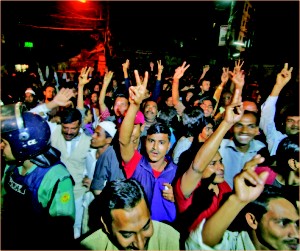 |
Photo: A.M.Ahad/Drik News |
The constitution vests the Republic's legislative powers in the parliament. It empowers the parliamentary committees to examine draft bills and other legislative proposals to before placing them in parliament to enact laws. The committees are constitutionally empowered to determine the necessity of enacting laws before they are placed as bills in parliament.
But the reality looks very bleak. None of the successive government followed the provision since the first parliament in 1973. Rather, the common practice is that bureaucrats draft the laws and the cabinet approves those after holding discussions. Getting the cabinet's approval, the draft bills are placed in the House as bills for turning them into laws.
The bills are sent to the parliamentary standing committees for scrutiny only after they are placed in parliament. The committees can do little in determining the necessity of the bills as ministers, who place the bills, obtain permission from the House to specify timeframe for the committees to submit scrutiny reports to parliament clearing the way for their passage.
Moreover, lawmakers, particularly those belong to the treasury bench, can not criticise or oppose any government bill due to the article 70, fearing to lose membership in parliament.
Thus, the parliaments have passed over 1,000 bills since 1973, but none was sent to the committees before placing them in parliament.
Therefore, the parliament's legislative powers are actually controlled by the executive. And the practice began at the beginning of the before the constitution was made.
In fact, the executive's dominance in exercising the legislative powers began in the Constituent Assembly. At that time the assembly was not given the legislative power to make law. The executive made laws without any consultation or involvement of the people's representatives. During the year of 1971, the president promulgated two ordinances and five orders in the form of President's Orders (PO).
During the year of 1972, the president promulgated 166 orders. He promulgated 37 orders in 1973 until under the new constitution the first parliament with the legislative authority was formed on April 7 of the same year.
Due to lack of interest of successive executive branches, no parliament in the last three and a half decades could move to enact a law for empowering the committee system despite the fact that a parliament's success largely depends on proper functioning of its committees.
Article 76 (3) of the constitution says, "Parliament may by law confer on committees appointed under this article powers for enforcing the attendance of witnesses and examining them on oath, affirmation or otherwise and compelling the production of documents.
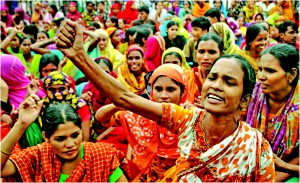 |
Photo: Amirul Rajiv |
Faced with logistic crisis, the parliamentary standing committees in many occasions have been facing difficulties to ensure presence of witness.
However, the one major reform brought to strengthen the committee system in the seventh parliament was introducing provision for making MPs chiefs of the committees, imposing restriction on ministers to head the parliamentary bodies.
Similarly, none of the previous government moved to appoint Ombudsman to strengthen parliamentary oversight on the executive. The constitution provides for the establishment of the office of Ombudsman, who shall investigate any action taken by a ministry, a public officer or a statutory public authority.
What's waiting for!
Abuse of state power paved the way for extra-constitutional usurpers and gave birth to the sixth parliament, which had a life of only 11 days. Capturing state power by any means also increased alarmingly mistrust and confrontation in politics resulting in introduction of undemocratic caretaker government system by the sixth parliament.
And in the latest, it is the confrontational politics that gave birth to an emergency regime backed by the army for around two years.
Ineffectiveness of successive parliaments has failed to meet people's expectation, allowing the rise of unchecked executive branch led by all-powerful prime minister marginalising the prospect of establishing good governance.
If the overall political culture is not improved and parliament is not made effective in true sense, then future will remain bleak! And any conscious people may predict what is waiting for us in the days coming?
The writer is a Senior Reporter, The Daily Star.